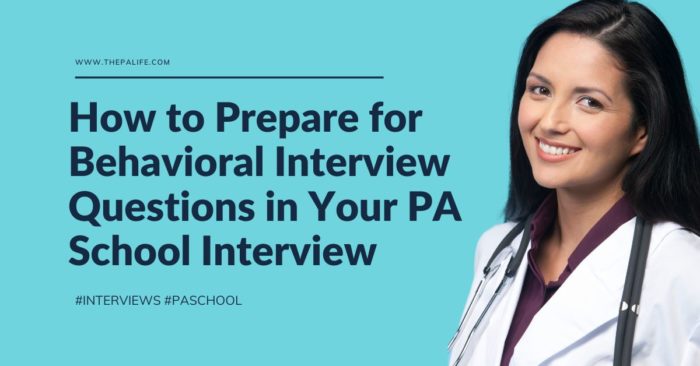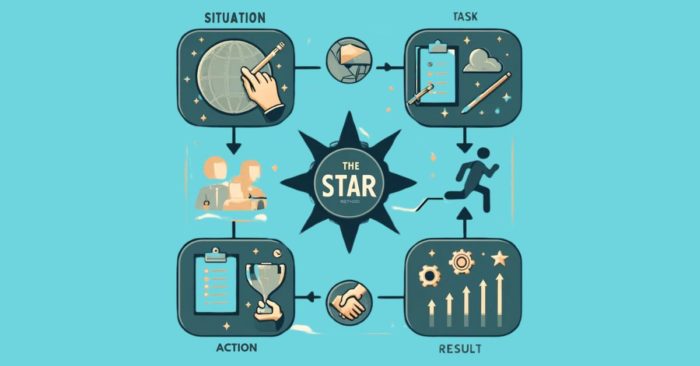
Effective Strategies and Real-Life Examples for Mastering Behavioral Interview Questions
If you're preparing for a Physician Assistant (PA) school interview, you're likely aware that behavioral interview questions are a critical component.
These questions are designed to uncover how you have handled various situations in the past, providing insight into your potential as a future PA.
The way you respond to these questions can make a big difference in the success of your interview. This blog post will guide you through strategies to prepare for these difficult questions and will offer example answers to some common scenarios.
Understanding Behavioral Interview Questions
- Strategies for Preparing for Behavioral Interview Questions
- Strategy 1. Understand the Competencies:
- Strategy 2. Use the STAR Method
- Strategy 3. Reflect on Relevant Experiences
- Strategy 4: Customize Your Answers
- Strategy 5: Practice, But Don’t Memorize
- Example Behavioral Interview Questions and Answers
- Conclusion: Navigating Your PA School Interview with Confidence and Authenticity
Behavioral interview questions are designed to reveal insights into your previous actions in specific situations.
The rationale is that your past behavior is the best predictor of your future performance. In the context of PA school interviews, these questions are used to assess qualities such as empathy, teamwork, leadership, resilience, and ethical judgment.
The rationale behind these questions is rooted in the idea that past behavior is the best predictor of future performance. For PA school interviews, this means that admissions committees are looking for evidence that you possess the qualities necessary to succeed both in PA school and as a practicing PA.
Typical behavioral questions might include:
- Can you describe a time when you had to handle a stressful situation?
- Tell me about a moment when you made a mistake. How did you handle it?
- Have you ever had a conflict with a coworker or classmate? How was it resolved?
- Tell me about a time you interacted with a really challenging patient.
These questions require more than just theoretical answers; they demand concrete examples that demonstrate your character and skills.
Strategies for Preparing for Behavioral Interview Questions

Strategy 1. Understand the Competencies:
First and foremost, research the PA program where you are interviewing and identify the competencies that the program values. This can often be found in the program's mission statement, during an open house, on pre-PA forums, PA virtual fairs, or by querying a current PA student at the program.
Common competencies might include communication skills, ethical decision-making, critical thinking, and teamwork. Understanding these will allow you to tailor your responses to reflect the qualities they are looking for.
Strategy 2. Use the STAR Method
The STAR method is a structured manner of responding to a behavioral interview question by discussing the specific Situation, Task, Action, and Result of the experience you are describing:
- Situation: Set the scene and give the necessary details of your example.
- Task: Describe what your responsibility was in that situation.
- Action: Explain exactly what steps you took to address it.
- Result: Share what outcomes your actions achieved.
Using the STAR method ensures that your answer is coherent, engaging, and complete. It helps you deliver a clear story that demonstrates your competencies effectively.
Strategy 3. Reflect on Relevant Experiences
Before your interview, spend time reflecting on your experiences from school, work, volunteer activities, or personal life. Identify situations that highlight your critical thinking, teamwork, communication skills, and adaptability. Make a list of these experiences and practice articulating them using the STAR method.
Strategy 4: Customize Your Answers
While it’s helpful to prepare answers to common behavioral questions, it’s essential to tailor your responses to reflect the specific values and competencies that the PA program you are applying to emphasizes. Use the information gathered from strategy 1 (when you researched the program thoroughly) and try to understand what characteristics they value most in their students.
Strategy 5: Practice, But Don’t Memorize
Practicing your answers is crucial to perform confidently, but beware of over-rehearsing. You want to avoid sounding like you're reciting a script during the interview. Instead, focus on understanding the structure of your answers and the key points you want to convey. This approach will help you to be more adaptable in the interview and to respond naturally to the questions asked.
Example Behavioral Interview Questions and Answers

Let's apply these strategies to some common PA school behavioral interview questions.
Example 1: Tell me about a time you interacted with a really challenging patient.
- Situation: During my shift at a busy family practice clinic, a patient became visibly upset after waiting over an hour past his scheduled appointment time. He expressed his frustration loudly in the waiting room, stating his intention to leave without seeing the doctor.
- Task: As the front desk coordinator, it was my responsibility to manage the situation, ensure the patient felt heard, and prevent him from leaving without receiving the care he needed.
- Action: I approached the patient calmly and empathetically, apologizing for the delay and explaining the reasons behind it, which were unforeseen emergencies that required immediate attention. I reassured him that his appointment was a priority and that we would expedite his visit as soon as possible. To demonstrate our commitment to his care, I offered a complimentary beverage and a quiet place to wait, ensuring he felt valued and respected.
- Result: The patient decided to stay after our conversation, appreciating the transparency and the measures taken to accommodate him. He later expressed gratitude for the care received and understanding of the situation. This experience reinforced the importance of effective communication and empathy in resolving patient dissatisfaction and maintaining trust in healthcare settings.
Real-world response: Mock interview with Daniela Alcázar
In this real-world example, Daniela opens up about her encounters with emotionally charged patients in an oncology department. Under the guidance of PA Life mock interviewer Tolu Fannon, Daniela discusses the complex emotions these patients experience and how clear communication and kindness can make a significant difference. Tolu emphasizes the importance of answering interview questions with specific examples and lessons learned, advising viewers on the best practices for narrative clarity and authenticity. She stresses that general responses can lead to missed opportunities to demonstrate real-life proficiency.
Example 2: Tell me about a moment when you made a mistake. How did you handle it?
- Situation: In one of my first volunteer experiences at a local hospital, I accidentally violated HIPAA regulations by discussing patient details in a non-secure environment.
- Task: I needed to rectify the mistake and ensure it didn’t happen again.
- Action: I immediately reported the incident to my supervisor, apologized, and attended additional training on HIPAA compliance.
- Result: My openness in addressing the mistake and taking corrective action helped reinforce the importance of privacy regulations, and I have maintained a spotless record since.
Example 3: Have you ever had a conflict with a coworker or classmate? How was it resolved?
- Situation: During a group project in my undergraduate program, there was a misunderstanding about the division of work, leading to a conflict.
- Task: As the team leader, it was my job to resolve the conflict.
- Action: I organized a meeting to openly discuss everyone's expectations and perceptions. Through this dialogue, we realized the communication error and collaboratively redesigned the task division to be more equitable.
- Result: The project was not only completed on time but received high praise from our professor. This incident underscored the importance of clear communication and teamwork.
Example 4: Tell me about a time when you had to work closely with someone whose personality was very different from yours.
- Situation: As an EMT with a calm, methodical approach, I was paired with a partner who preferred intuitive, aggressive actions during emergencies.
- Task: Our goal was to provide efficient medical assistance and ensure patient safety while managing our differing approaches.
- Action: We discussed the importance of balancing our methods and agreed to review each call together to learn from each other’s strengths and improve our teamwork.
- Result: This approach led to better collaboration and more effective emergency responses, enhancing our ability to care for patients and earning recognition from our team and supervisors.
Example 5: Give an example of how you handled a high-pressure situation.
- Situation: During my time as an emergency room technician, there was an instance when we had multiple critical patients arrive simultaneously.
- Task: My role was to assist with triaging patients and providing initial care.
- Action: I prioritized patient needs based on the severity of their conditions, communicated effectively with the nursing staff and doctors, and made sure that all documentation was handled swiftly and accurately.
- Result: My actions helped streamline the workflow and ensured that all patients received timely care. My team was able to manage the situation more effectively due to my initiative in organizing the immediate tasks and communication.
Conclusion: Navigating Your PA School Interview with Confidence and Authenticity
Preparing for behavioral interview questions is more than rehearsing answers—it's about demonstrating the core competencies that make a successful PA. This blog post has equipped you with the strategies and insights needed to transform your personal experiences into compelling stories that showcase your skills, empathy, and readiness for the challenges of PA school and beyond.
Remember, the key to success in these interviews lies in your ability to articulate real-world examples that highlight your adaptability, problem-solving capabilities, and ability to work effectively under pressure. The STAR method is not just a tool for structuring responses; it's a way to communicate your personal journey and professional ethos in a narrative that resonates with interview panels.
As you continue to prepare for your PA school interviews, take the time to reflect deeply on your experiences, practice your storytelling skills, and, most importantly, remain authentic to your true self. The examples and strategies discussed here are designed to inspire and guide you, but your unique experiences and genuine responses will make you stand out as a candidate.
Good luck, and may your journey to becoming a PA will be fulfilling and successful!
Additional reading:
Enhance Your Preparation with Our Tailored Mock Interviews and Comprehensive PA Consulting Services
To further enhance your preparation, consider our specialized services designed to boost your readiness and confidence. Our Mock PA School Interview Service offers a realistic interview experience with personalized feedback from experienced PA educators and admissions experts. For more comprehensive guidance, our Pre-PA Consulting Service provides in-depth support on application strategy, document preparation, and one-on-one coaching.
Mock PA School Interview Service
Our Mock PA School Interview Service offers a realistic interview experience tailored to the unique demands of PA school applications. By participating, you'll receive:
- Personalized feedback from experienced PA educators and admissions experts.
- Insight into the types of questions you'll face, including those tough behavioral queries.
- Techniques and tips to improve both your answers and your confidence.
Pre-PA Consulting Service
For more comprehensive preparation, consider our Pre-PA Consulting Service. This service is perfect for candidates who are seeking:
- Advice on application strategy to strengthen your PA school application.
- Guidance on personal statement writing, resume crafting, and securing impactful letters of recommendation.
- One-on-one coaching sessions to develop a clear and compelling narrative for your PA school journey.
View all posts in this series
- My PA School Interview: The Journey of a Lifetime
- The Top 46 Physician Assistant Applicant Interview Questions
- Use this Interview Hack to Get The Physician Assistant Job of Your Dreams!
- The Physician Assistant Job or PA School Interview – Email Etiquette
- The Physician Assistant Interview: Thank You and Follow-up (With Sample)
- A Look Inside Two PA School Interviews
- 5 Things I’ve Learned Going Into My Fourth Physician Assistant Application Cycle
- 300 PA School Interview Questions You Should Be Ready to Answer
- PA School Mock Interviews: Prepare with a LIVE, Recorded Video Interview
- Mock Physician Assistant School Interview With Taylor Hill Pre-PA
- Mock PA School Interview With Pre-PA Lily Boyle
- The Interview That Got This Pre-PA Into 5 PA Schools
- 101 PA School Applicants Answer: What’s Your Greatest Strength?
- Mastering Your PA School Interview: Tone Matters
- The Worst PA School Interview Question Ever!
- Why Choose PA Over NP? Here’s the Perfect Answer
- Don’t Make This Critical PA School Interview Mistake!
- 5 Best Ways to Give a Memorable PA School Interview
- 3 Things to Do the Night Before Your PA School Interview
- How to Prepare for Your PA School Interview Day Essay
- How to Squash PA School Interview Day Stress (4 Simple Steps)
- Mind Mapping: A Tool for Personal Statements, Supplemental Essays, and Interviews
- Here’s What a REAL PA School Interview Looks Like (in 2024)
- My PA School Interview Preparation Strategy
- How to Bring Your Best on PA School Interview Day
- How to Cope with PA School Application Rejection
- ChatGPT Answers the Top 46 PA School Applicant Interview Questions
- Why Our Program? How to Answer This Common Supplemental Essay and Interview Question
- What is a PA? How to Nail This Not-So-Easy Interview Question
- How to Answer Behavioral Questions in Your PA School Interview















Leave a Reply